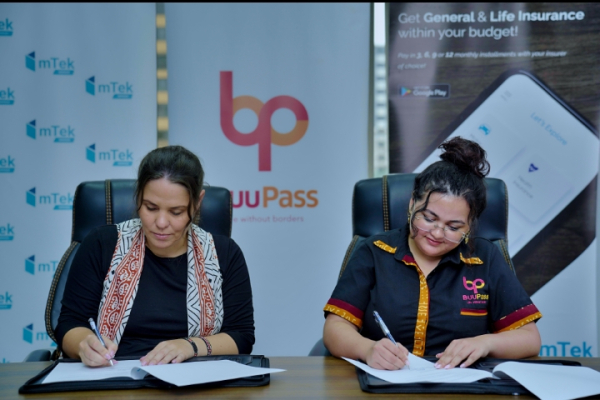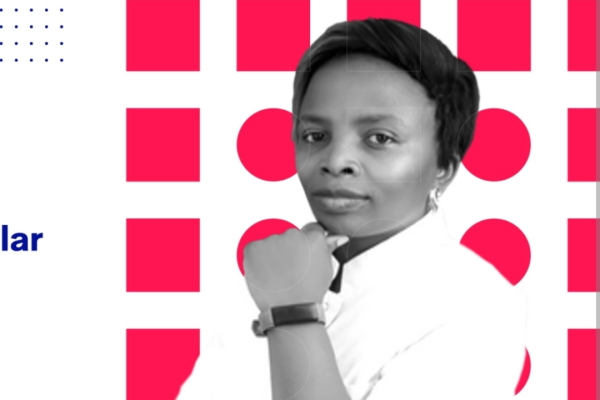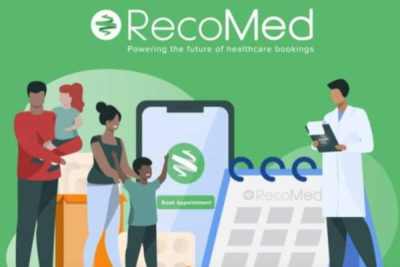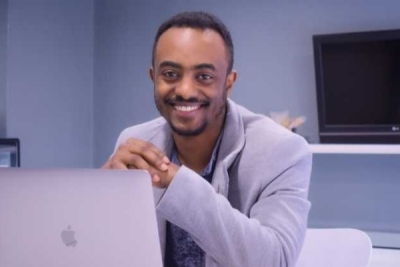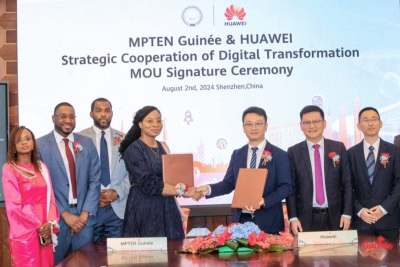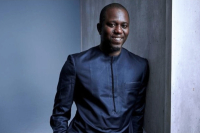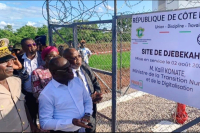Kenyan digital insurance platform mTek has partnered with BuuPass, a Kenyan Transportation platform, to provide integrated travel insurance. This partnership allows customers to easily select and purchase insurance while booking tickets on BuuPass, enhancing convenience and safety.
The move aims to enhance travel experience by providing additional safety and financial protection, allowing travelers to feel more secure and confident during their trips.
An experienced nurse, she is committed to democratizing healthcare in Africa. A few years ago, she founded an innovative company that leverages technology to simplify access to nursing services.
Ginyu Innocentia Kwalar is a Cameroonian nurse and entrepreneur. She is the founder and CEO of Klarah, a startup dedicated to providing quality, affordable, and accessible healthcare to every African. Founded in 2021, Klarah connects experienced nurses to with patients through mobile applications and interactive dashboards. "We are leveraging technology to match nurses to patients so that quality healthcare can be offered in the comfort of their homes," explained Ginyu Innocentia Kwalar in 2023.
Klarah's nurses are trained to simplify medical jargon, discuss health issues, and help patients ask relevant questions about their well-being. The startup offers a range of services, including wound care, health check-ups, diabetic and hypertension care, post-hospitalization care, and patient education. Currently, Klarah has 400 dedicated nurses providing patient care.
Ginyu Innocentia Kwalar is also an assistant lecturer at the University of Buea, where she earned a bachelor's degree in nursing in 2001 and a PhD in public health in 2022. She holds a master's degree in internal medicine from the University of Yaoundé 1, obtained in 2008. To gain experience, she worked as a nurse at Nkambe District Hospital from 2003 to 2010. From 2013 to 2021, she served as a senior nurse at Buea Regional Hospital, where she was in charge of the emergency and outpatient units.
Melchior Koba
E-health solutions are rapidly spreading across Africa, offering promising ways to expand healthcare access in continent.
RecoMed is a South African e-health platform founded in 2013 by Sheraan Amod to connect patients with healthcare providers across the country.
Its web-based platform allows users to search for doctors and book appointments online. It also offers a pharmacy service, with options for delivery or in-store pickup. RecoMed has no mobile app.
To help medical practices expand their reach, the startup offers a white-label solution that integrates with existing practice management software. “Our white label solution combines your provider base and RecoMed’s rich booking functionality with seamless PMA workflow integration. This scalable solution will increase bookings, improve efficiency, and boost patient convenience and satisfaction,” RecoMed states.
The platform claims over 100,000 online bookings, 200,000 monthly visitors, and 20,000 patient recommendations each month. It also works with 3,000 healthcare providers in cities including Pretoria, Johannesburg, Cape Town, and Durban.
Adoni Conrad Quenum
A computer science graduate, he focuses on creating mobile games inspired by African culture. As the head of Qene Games, he has developed two award-winning games.
Dawit Abraham (photo), an Ethiopian computer scientist and tech entrepreneur, is the co-founder and CEO of Qene Games, a mobile game publishing company based in Ethiopia.
Founded in 2016, Qene Games aims to showcase the richness and beauty of Ethiopian culture in the global gaming and entertainment industry. The startup has launched two mobile games so far.
Kukulu, their first game, is a 3D runner where the player, represented by a rooster, must escape a farmer by jumping over fences and running through bushes. Their second game, Gebeta, is a mobile board game based on the principles of mancala games (awélé, bao, kalaha, etc.). Gebeta was later acquired by the pan-African mobile game publisher Carry1st.
Kukulu won the AppsAfrica award for Best Media and Entertainment App in 2018, while Gebeta was awarded the AppsAfrica prize for Best App of the Year in 2020.
Dawit is also a co-founder and spokesperson for the Pan Africa Gaming Group, a network established in 2022 that brings together top video game development talents in Africa. In 2023, he became the co-founder and CEO of Beemi, an interactive streaming platform focused on games.
After graduating from Addis Ababa University with a bachelor's degree in electrical and computer engineering, Dawit's career began in 2015 at iCog-Labs, an Ethiopian R&D company specializing in AI and robotics, where he worked as a game developer and machine learning programmer. In 2020, he was a game developer at Turing, a U.S.-based AI company, and then joined the International Finance Corporation as a product development advisor from 2020 to 2023.
Melchior Koba
The government aims to develop the ICT sector and create a digital government that serves all Guineans by 2027.
The Chinese technology firm Huawei will support Guinea in its digital transformation. The support aims to implement robust innovative digital infrastructure to promote widespread access to ICT in Guinea. It was officialized by a memorandum of understanding signed, on Friday August 2nd, during the China-Africa Digital Cooperation Forum recently held in Beijing, China.
Under this agreement, Huawei will assist Guinea in deploying high-speed networks, including fiber optics, to improve connectivity in both urban and rural areas. It also involves helping the country implement e-government solutions to streamline administrative processes and enhance the efficiency of public services. Other projects include developing digital platforms, data centers, and innovation hubs; establishing training and research programs in ICT and digital fields; and strengthening cybersecurity.
The signing of this memorandum of understanding is the result of recent discussions between Rose Pola Pricemou, Guinea’s Minister of Digital Affairs, and a delegation from Huawei, led by its General Manager in Guinea. During these discussions, both parties explored collaboration opportunities, focusing on information systems (SMSI), strengthening the fiber optic backbone, and extending Internet coverage in underserved rural areas.
Huawei's new commitment to Guinea is expected to not only improve the quality and coverage of connectivity services in the country but also reduce their costs. According to the latest official statistics, the country has 7.7 million internet subscribers, with a penetration rate of 56.27%. Guinea, which recently received $60 million from the World Bank for digital projects, hopes to achieve a qualitative leap in its digital transformation through this partnership.
Samira Njoya
As African economies increasingly rely on digital technologies for growth, secure and reliable internet access becomes vital. Enhancing cybersecurity and digital trust helps facilitate online transactions, attract foreign investment, and support economic diversification.
The World Bank announced, on July 29, a call for expressions of interest for a project in Cameroon to strengthen digital trust and boost online transaction security. The initiative seeks experts in cybersecurity policy, capacity assessments, trust frameworks, e-transactions, e-signatures, and public key infrastructure. Proposals are due by August 12.
The consultant will assist in updating Cameroon's National Cybersecurity Strategy from 2018, enhance the regulatory framework for e-signatures, and establish a public key infrastructure. Responsibilities include conducting gap analyses, providing policy recommendations, and hosting capacity-building workshops for government officials.
Selection criteria include the firm's experience, expertise, technical and management skills, and key personnel qualifications. The project is scheduled to begin in September 2024 and is expected to last for nine months.
Cameroon has made strides in establishing a trust framework for online transactions, including the 2010 Law on Cybersecurity and Cybercrime (2010-012), the Law on E-commerce (2010-021), and the 2019 Decree (2019-150) on the National Agency for Information and Communication Technologies (ANTIC). ANTIC regulates cybersecurity and electronic activities. However, the National Cybersecurity Strategy from 2018 remains only partially implemented.
While Cameroon’s legal and regulatory framework reflects a commitment to a secure digital environment, the incomplete implementation of the National Cybersecurity Strategy highlights a governance gap. The World Bank’s call for expert support is vital for refining these efforts and enhancing digital trust and security. Updating the cybersecurity law to address threats like DeepFakes is crucial for protecting citizens and aligning with international standards, thereby strengthening justice and trust in the digital era.
Hikmatu Bilali
Pan-African fintech firm Flutterwave has been granted an Enhanced Category Payment Service Provider license by the Bank of Ghana, it announced on August 1. This license enables Flutterwave to offer a wide range of payment services directly in Ghana, eliminating the need for third-party services and simplifying payment processes for businesses and consumers.
The firm aims to unify the fragmented payment infrastructure in Africa and support local fintech companies, contributing to a more integrated financial ecosystem.
After completing his higher education in France, he worked on artificial intelligence projects for companies such as Facebook and Google. Now an entrepreneur, he leverages his expertise to improve access to healthcare services in Africa.
Moustapha Cisse (photo), a Senegalese expert in artificial intelligence and machine learning, founded Kera Health Platforms in 2023, a startup that develops a digital health platform powered by artificial intelligence (AI), where he serves as CEO. Kera Health Platforms connects healthcare providers with communities to promote healthier lives in Africa and beyond.
The idea for this startup dates back to 2004 when Moustapha Cisse, then 19 years old, fell seriously ill. His condition worsened due to a misdiagnosis and inappropriate treatment. "I had been misdiagnosed, and what I was being treated for was slowly killing me. I was eventually correctly diagnosed and treated, and through a long process, I recovered. That was one of the most difficult experiences of my lifetime and left me deeply curious about how something like that could happen. I went to university and studied math, physics, and artificial intelligence. Still, I was curious about the health sector and knew there was an opportunity to leverage technology to solve some of Africa’s most pressing healthcare needs," he recounted in May 2024.
Moustapha Cisse is a professor of machine learning at the African Institute of Mathematical Sciences. In 2018, he founded the African Masters of Machine Intelligence, a graduate program in AI that he has directed ever since.
A graduate of Pierre and Marie Curie University in France, Moustapha Cisse earned a master's degree in artificial intelligence in 2010 and a Ph.D. in computer science in 2014. In 2016, he joined Facebook as an AI researcher. In 2018, he co-founded and led until June 2023, Google's first AI engineering and research center in Africa, located in Accra, Ghana.
Melchior Koba
Since 2016, the International Telecommunication Union (ITU) has been encouraging African governments to improve internet access in rural areas. Côte d'Ivoire is working to address this challenge through various initiatives.
The Ivorian government on Friday launched an initiative to bring internet access to rural communities across the country.
Ibrahim Kalil Konaté, Minister of Digital Transition and Digitalization, officially kicked off the program in Djébékaha, a town in the Napié sub-prefecture. The project aims to connect 175 rural localities.
The program, part of the first phase of the World Bank-funded Digital Solutions Project for Opening Up Rural Areas and E-Agriculture (PSDEA), involves building 160 towers to improve connectivity in the Bagoué, Poro, Folon, Bounkani, Tchologo, and Marahoué regions. The PSDEA, launched in 2018, has received $63.2 million in World Bank funding to bridge the digital divide and promote digital agriculture.
The government plans to connect an additional 240 localities in the second phase of the project. A third phase, scheduled for 2025, will connect 160 more, bringing the total to 575 connected rural communities. This will provide thousands of Ivorians with access to online public services, telemedicine, and digital economic opportunities.
Rural connectivity is one of the flagship projects in the 2024 budget allocated to the Ministry of Digital Transition and Digitalization. This budget, amounting to XOF55.6 billion, aims to attract more investments, digitize citizen services, extend digital connectivity in uncovered rural areas, and develop inclusive digital skills nationwide.
Samira Njoya
The digital transformation of judicial systems in Africa holds significant importance for the continent's development. Digital systems reduce the need for physical paperwork, court visits, and administrative tasks, leading to considerable cost savings for the judiciary and litigants. This is particularly beneficial in resource-constrained environments.
Starting August 12, 2024, all urgent applications in the South African Labour Court will be submitted through the Court Online System. Acting Judge President of the Labour Court, Edwin Mogomotsi Molahlehi, announced in a directive signed July 31 that the Office of the Chief Justice has established this e-filing solution for the country's superior courts.
The system allows law firms and litigants to file petitions and documents online and manage court schedules and evidence in real time. Judge Molahlehi clarified that "all urgent applications in the Labour Court will be initiated on Court Online from the specified date. Unless otherwise directed, existing cases cannot be initiated on Court Online." The Court Online System is a comprehensive platform for South Africa's High Courts that facilitates E-Filing, Digital Case Management, and Evidence Management. It enables the electronic sharing and filing of documents, streamlines the inspection of documents, and provides fast, accurate, real-time updates on case statuses.
The South African government has been investing in ICT infrastructure, with digital government services becoming a key focus. For example, the South African National Development Plan envisions increased access to electronic services by 2030.
In the 2023 Network Readiness Index (NRI), which assesses the application and impact of information and communication technology (ICT) across global economies, South Africa is ranked 74th out of 134 countries. The country holds the 2nd position in Africa. South Africa demonstrated strong performance across four key pillars: Technology (including Access, Content, and Future Technologies), People (encompassing Individuals, Businesses, and Governments), Governance (covering Trust, Regulation, and Inclusion), and Impact (focusing on Economy, Quality of Life, and Sustainable Development Goals contribution).
Hikmatu Bilali
More...
In 2023, Ghana officially recorded 11,694 road accidents. To reduce that number, authorities are turning to advanced technologies.
On July 30, the Ghanaian Ministry of Roads and Highways announced the launch of a mobile application called "Maintain My Road." This app will allow citizens to report road issues, aiming to enhance road safety and infrastructure.
The pilot phase, spanning five months, targets major roads in four key cities: Accra-Tema, Kumasi, Takoradi, and Tamale. "The accessibility provided by a well-maintained road system enhances tourism by connecting visitors to key attractions, generating revenue, and creating jobs in the hospitality sector," stated Francis Asenso-Boakye, Ghana’s Minister of Roads and Highways.
Between January and October 2023, the National Road Safety Authority (NRSA) recorded 11,694 road accidents in the country. In response, authorities have implemented advanced technology using cameras and sensors to detect and penalize traffic violations such as speeding and running red lights. The launch of "Maintain My Road" is part of this broader initiative.
Additionally, a call center has been established with the same objective. It operates Monday through Friday from 8 AM to 5 PM, with customer service representatives fluent in several local languages, including Twi, Ga, and soon Hausa.
Adoni Conrad Quenum
Information and Communication Technology (ICT) is key to the Kenyan government's socioeconomic development strategy. To achieve its ambitious goals, the country is enlisting the expertise of experienced professionals to guide its efforts.
On Monday, July 29, the Kenyan government announced the recruitment of 46 ICT directors who will be assigned to various ministries and state departments. These ICT leaders are expected to utilize their skills and expertise to create job opportunities for young, unemployed Kenyans.
The 46 engineers, appointed as part of an ongoing government reshuffle, will focus on enhancing service delivery to citizens and developing the digital economy.
"Their diverse expertise in Research and Digital Innovation, Software Development, E-commerce and Entrepreneurship, Cybersecurity, and Systems Audit and Control will be instrumental in advancing the Ministry's mission to build an informed and digitally empowered Kenyan society," said John Kipchumba Tanui, Principal Secretary of the State Department for ICT and Digital Economy.
This recruitment initiative is part of the Kenyan government's broader strategy to generate digital jobs for youth through the digital highway and creative economy, which are key components of the Bottom-Up Economic Transformation Agenda (BETA). This agenda serves as a crucial catalyst for other economic pillars, aiming to boost investments in sectors vital for economic growth and household well-being.
The newly appointed directors will work diligently to help the government achieve its ambitious digital objectives. Their contributions are expected to enhance administrative efficiency, improve public service delivery, strengthen digital infrastructure, and drive economic growth through digital transformation initiatives.
For the 2024/2025 fiscal year, the Kenyan executive has allocated approximately $125.3 million to ICT sector projects, marking a significant increase from the $108.4 million designated for the 2023/2024 fiscal year.
Samira Njoya
An IT specialist by training, he helps African online retailers streamline their parcel delivery process. His digital solution accelerates and simplifies the shipping of goods.
Imad El Mansour Zekri(photo) is a Moroccan IT specialist and tech entrepreneur, serving as the founder and CEO of Cathedis, a tech startup focused on parcel delivery for e-commerce businesses.
Established in 2015, Cathedis provides a fully digital logistics platform designed to cater to consumer needs. The company offers services such as delivery options, online or cash-on-delivery payments, and real-time tracking of parcels and delivery personnel. Cathedis aims to digitize and automate the centralization and distribution of parcels across Africa.
"We offer a fully digital delivery solution that includes pickup from stores, order processing, physical delivery, proof of delivery, and funds return," Zekri explained in 2020.
Zekri holds a specialized technician diploma in IT management, which he obtained in 2008 from Pigier School in Morocco. He also earned a master's degree in systems engineering, networks, and security in 2011 from the Faculty of Science and Technology at Hassan 1st University in Settat, Morocco.
To build his expertise, Zekri began his career in 2010 as a technical sales engineer at AGT Maroc, a company specializing in the integration of IT and telecom networks. In 2015, he transitioned to Integradis Europe, where he continued as a technical sales engineer, focusing on IT development and digital services.
Melchior Koba
He is a digital transformation expert who helps businesses succeed. He provides data collection and marketing tools specifically designed for e-commerce entrepreneurs.
Bashanganyi Magwape (photo) is a Botswanan computer scientist and serial entrepreneur. Co-founder and CEO of Meeticks Africa, he provides businesses with the tools, access, and support they need to thrive.
Founded in 2020 by Bashanganyi Magwape and Ismael Camara, Meeticks Africa helps small businesses source supplies, digitize their operations, and expand their customer base. Its mission is to "unlock value in Africa's informal communities and markets through online commerce."
One of Meeticks Africa's key innovations is a WhatsApp chatbot that enables e-commerce merchants to reach more customers across the country. This solution simplifies inventory management, orders, restocking, and accounting digitally.
In 2022, Meeticks Africa launched Jaabi, an innovative technology that allows users to collect data for surveys, market research, and subscription forms. Utilizing the WhatsApp Business API, Jaabi makes data collection more accessible and efficient.
The startup also offers an entrepreneurship program called DoDigi. The goal of this program is "to train, upskill, and economically support 3,000 women entrepreneurs in Southern Africa over the next three years," stated the CEO of Meeticks Africa in 2022.
Bashanganyi Magwape is a digital consultant for the Dream Factory Foundation, an organization aimed at empowering youth through education. He holds a degree in computer science obtained in 2006 from the Botswana Accountancy College (BAC). He also has a degree in sound engineering (2008) from CityVarsity School of Media and Creative Arts in South Africa.
In 2008, the entrepreneur worked as a music solutions assistant at Mama Dance, a music platform. From 2013 to 2021, he was the director of Youngpreneurs Media, an audiovisual content creation company. Between 2018 and 2023, he served as CEO of Basha Consulting, a company specializing in digital transformation.
Melchior Koba


